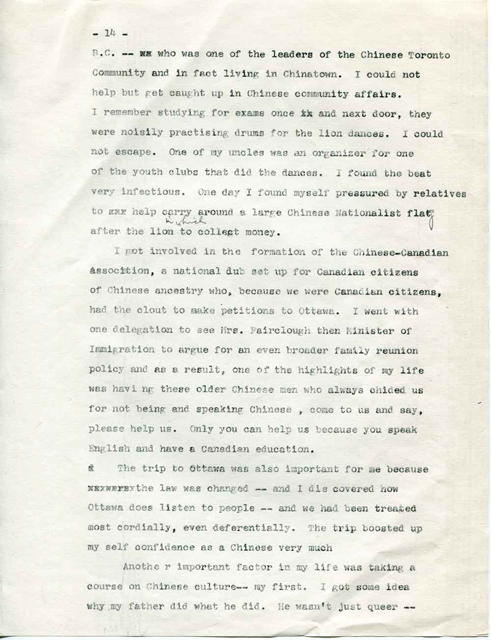Lor Malloy, Ruth
Ruth Lor Malloy was born in 1932 in Brockville, Ontario. She moved to Toronto, Ontario as a young woman to attend the University of Toronto, where she studied sociology and philosophy. She joined several clubs, including the Student Christian Movement and the Chinese Canadian Association. After graduating from university in 1954, Ruth participated in a work camp in Washington, D.C, where she learned about non-violent solutions to racial discrimination. That same year, she became involved with the Canadian Congress of Labour’s project to test Ontario’s Fair Accommodations Practices Act. Along with other labour activists, she tested a business in racially segregated Dresden, Ontario, which thrust her into local headlines. In her youth, Ruth converted to the Quaker faith and throughout the 1950s, she volunteered for several Quaker, World Council of Churches, and Canadian Council of Churches work camps that took her to Mexico, Brazil, Japan, and the Canadian Arctic. She met fellow writer Mike Malloy in New Delhi, India and the two married in Hong Kong in 1965. After traveling to China in 1965, and then again in 1972, she wrote the first English-language travel guide for visitors of Chinese heritage, which was updated in thirteen subsequent editions for all foreign visitors. While living in several places around the world, including Southeast Asia and the United States, Ruth has maintained a career as a freelance writer and photo-journalist. At the time of the interview, she resided in Toronto, Ontario and collected and preserved Asian textiles.
Ruth Lor Malloy’s biography charts her family’s history and arrival in Canada, describes the experience of growing up Chinese Canadian in a small Ontario town, and provides historical details about the Chinese experience in Canada. She provides first hand testimony about the effects of exclusionary immigration laws and Chinese political events on both sides of the Pacific. Ruth recounts factionalism within the post-war Chinese community and her work with the Chinese Canadian Association, which brought her to Ottawa to petition immigration law. She comments on issues of identity and her awakened interest in Chinese culture as a result of traveling to China.


 14 of 17
14 of 17 

